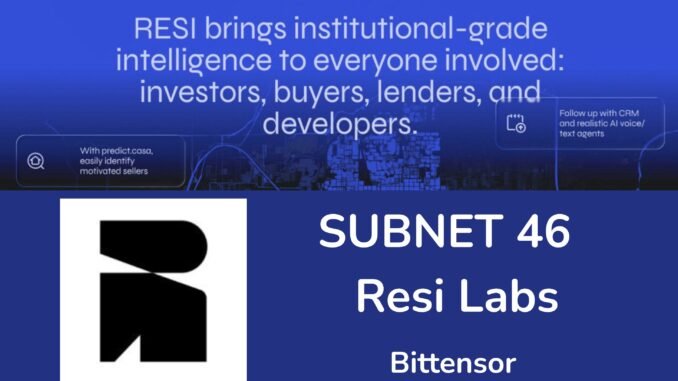
By: @CryptoZPunisher
Introduction
The U.S. real estate market represents $45 trillion in assets, with more than 5.5 million transactions each year. Yet, it remains fragmented, opaque, and dominated by a handful of platforms whose data is expensive and locked behind paywalls. RESI (Real Estate Super Intelligence), built on Subnet 46 of Bittensor, aims to change this paradigm by creating a decentralized AI infrastructure for real estate: open, scalable, and powered by the Bittensor network.
From NeuralAI to RESI — A Strategic Pivot
Originally, Subnet 46 was known as NeuralAI, a 3D asset generation project. After a charity auction in late 2024, it was acquired by Resi Labs and repurposed into a real estate intelligence subnet. This radical transformation gave birth to RESI, with the mission of building the largest open real estate database in the world, starting with over 150 million U.S. properties before expanding globally.
Why the Market Needs RESI
Today, access to real estate data faces three major obstacles:
- Prohibitive costs: existing databases charge more than $250,000 per year for limited access.
- Extreme fragmentation: property data is spread across thousands of county assessors, MLS systems, and private platforms, each requiring separate agreements.
- Restrictive licensing: even if you pay, providers often prohibit using the data to train AI models, a huge blocker for innovation.
RESI: A Decentralized and Transparent Solution
Resi Labs’ GitHub repository outlines the philosophy and architecture of the project:
“RESI creates the first open, real-time, national real estate database powered by decentralized intelligence.” “Miners compete to discover and submit property data… Field-level rewards encourage comprehensive data collection… Discovery bonuses reward new properties or rare data first… Multi-dimensional scoring based on data quality, rarity, and validation confidence.”
In practice:
- Miners collect property data (from Zillow, public records, etc.) and are rewarded field by field (address, build year, sales history, etc.).
- Discovery bonuses incentivize rare or newly discovered properties.
- Multi-dimensional scoring ensures accuracy, rarity, and consensus-based validation before integration.
- The result: a real-time national property database, accessible via modern APIs, with field-level trust scores and temporal mechanics (e.g., data decay over time).
This infrastructure is designed to be the backbone for profitable and scalable proptech businesses, impossible to build within today’s closed corporate silos.
Predict.casa: The First Live Use Case
- predict.casa has already facilitated $1 billion in real estate transaction volume since 2020 by identifying motivated sellers through hyperlocal data analysis.
- Integrated with RESI, predict.casa scales to millions of properties across 3,000+ counties.
- Miners fine-tune models to detect selling signals; validators ensure quality and accuracy.
- Output: skip-traced, qualified leads delivered directly to real estate professionals.

- $2,500 setup fee per county model.
- $5,000/month for 1,000 qualified contacts.
- 20–40% of revenue allocated to TAO buyback & burn — already live, with the first 8 TAO buyback announced by Seby Rubino in September 2025.
A Clear Roadmap

Strong Team & Open Community
Resi Labs, the team behind RESI, combines expertise in blockchain and real estate data systems:
- Seby Rubino – Project Lead @Sebyverse A crypto incentives and real estate expert, Seby drives RESI’s strategy: merging decentralized economics with the needs of the real estate industry.
- Caleb Gates – Technical Lead (AI Developer)
- Caleb Gates, LinkedIn – A veteran developer with national-level real estate data experience. Caleb leads engineering: data pipeline, consensus, APIs, and AI models. His background ensures RESI can scale to hundreds of millions of property records.
The team is actively growing: Resi Labs is recruiting developers (decentralized AI, scraping, ML, APIs) and encouraging contributions from the Bittensor and PropTech communities since the project is fully open-source.
ELI5
Right now, if you want to buy a house, you wait until it’s listed online. With RESI, AI looks at millions of signals (debt, renovations, moves, life events…) and tells you:
“This house is very likely to be for sale soon, and maybe even at a discount.”
Miners find the data, validators check it, and professionals receive the list before anyone else.
Why This Matters for Bittensor
- Proven use case: transforming a multi-trillion-dollar industry using Bittensor infra.
- Real economic model: directly linked to TAO, already active.
- Replicability: a blueprint for other industry-specific subnets (healthcare, finance, energy…).
Useful Links
- Resi Labs X account : @resilabsai
- Seby Rubino @Sebyverse
- Predict dot casa @predictcasa
- GitHub Resi Labs: resi-labs-ai/resi: Real estate super intelligence
- SN46 Proposal For Real Estate Super Intelligence
In Summary
Subnet 46 / RESI will likely become one of the strongest subnets on Bittensor, it combines a proven use case (predict.casa), a disruptive vision (open property data), a competent doxxed team, and an already active economic model (TAO buybacks). If successful, it could become the backbone of global real estate AI.

Enjoyed it? A like and a share are the best ways to support my work. Thank you!
🗺️ All links are listed on Magellan, the unique mind map of the network:
https://xmind.ai/share/aDEFBhk7?xid=VMLmgtuz
💜 Support my work If you enjoy my content and appreciate Magellan, you can support my work:
💸 Donation address: 5DnZ7Evyund7fPcBzntyVoNgzULTdyhscYCSzJA569131aGR




Be the first to comment